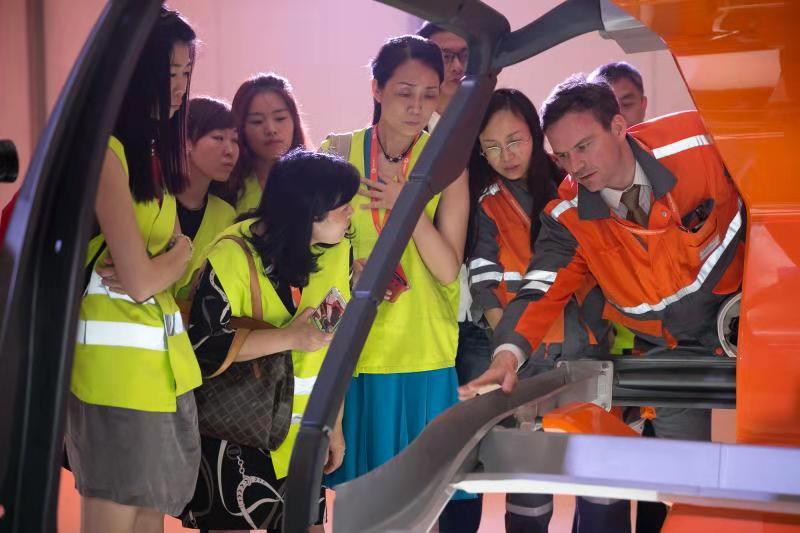
Jurgen Cobbaut, chief marketing officer of VAMA, introduces products in a production factory in central China’s Hunan Province. (Photo courtesy of VAMA )
The world leading steel producer ArcelorMittal started its presence in China since 2001, and in 2005 set up VAMA, an automotive steel joint venture with Hunan Valin Steel. As China leaps to become the world's largest steel producing and consuming country, it’s natural that the Chinese market is of interest to ArcelorMittal.
Sanjay Sharma, director of the VAMA board and CEO of ArcelorMittal China and India told the People’s Daily that ArcelorMittal is optimistic about the prospect of China’s reform and opening up in the new era, while the steel maker’s strength in green production supports China’s supply side reforms.
Below is a script of a written interview by the People's Daily with Sanjay Sharma:
Q: How does ArcelorMittal make its business plan mesh with the ongoing reform in China?
A: Our focus is on further establishing VAMA in the market, and helping to further advance the Chinese automotive industry. The automotive industry in China is currently undergoing significant reform, with car manufacturers facing increasing stringent safety and environmental regulation.
The automotive industry in China is currently undergoing significant reform, with car manufacturers facing increasing stringent safety and environmental regulation. China’s policies and “Blue Sky” targets, will require car makers to further reduce the weight of cars and develop new mobility solutions such as NEV. For it to achieve it ambitions, it needs the know-how of global technology leaders like ArcelorMittal. We therefore aim to grow together with the Chinese automotive industry and bring solutions to China supporting this growth.
Q: How does China’s opening up policy impact ArcelorMittal and the automotive industry?
A: In the past 20 years, we have seen significant reform in China to enable foreign direct investment and bring the technology and knowledge required for stimulate further Chinese economic growth.
This has been a very positive and important development for the country, and a natural and necessary step for any developing economy to take. These actions have enabled companies like ArcelorMittal to establish a presence in China, and share their expertise for mutual benefit.
And with gradually improving awareness of intelligence property protection, the Chinese market provides technologically-led companies like ArcelorMittal with a healthy competition environment in which to further develop.
The rapid development of China has profound global implications. In recent years China has not only sought to bring leading technology into the country, but has also focused on developing its own indigenous technology and bringing it to global markets.
One good example is high speed railway. Over the past 10 years, China has developed the world’s largest high-speed rail network of over 18,000 kilometers, simultaneously it has shared the knowledge and technology it has developed to support high-speed rail developments in countries including Russia and Brazil.
And I believe the automotive industry will also embrace a “going global” benefit, which will also bring the experience of working with Chinese customers to our business in other regions when working with the same customers’ plant abroad.
Q: As a foreign investor, how does ArcelorMittal engage with the changes in China's policies that further liberalized foreign investment over the past decades?
A: The business environment for foreign investments has become increasingly supportive over the past 20 years.
For example, restrictions on foreign enterprises owning steel companies have evolved and today, 100 percent foreign ownership of Chinese steel companies is possible. We’ve also seen reform in capital control to allow capital movement in and out of China, which has led to a rapid expansion of capital flows into China.
With the reform and opening-up policy, China has become one of the largest direct investment regions in the world. In 2017 alone, China attracted $131 billion in foreign direct investment (FDI), and became the world’s second largest direct investment country.
There has also been progressive labor policy reform, with increasing numbers of foreign nationals now able to work in China. Take VAMA as an example, over 100 foreign executives and staff in ArcelorMittal and equipment suppliers from countries including USA, Canada, Brazil, France, Germany, Belgium and India worked on VAMA’s construction.
The Hunan government has established several important supporting policies that have enabled the modernization of the province’s industrial landscape and introduced modern, advanced technologies.
Thanks to these supporting policies, the construction of modern infrastructure, and knowledge exchanges with senior leadership from different industries, the Hunan province government has facilitated a favorable environment for foreign investments.
Q: The 40-year-old reform and opening up policy has changed China very profoundly. China now pledges to ramp up the effort with a goal of achieving high quality development. What do you expect the new growth model will bring to foreign enterprises like ArcelorMittal?
A: China’s reform and opening up has facilitated the start of a shift from China being a manufacturing led economy to a technology led service economy. We’ve also seen much change in the Chinese steel industry in recent years.
I’ve also mentioned the removal of restrictions on foreign ownership. The other area of change is the ongoing supply side reform which has shifted the industry focus from quantitative growth to qualitative growth, by encouraging high-end manufacturing and simultaneously pushing closure of sub-scale, heavy polluting capacity.
For ArcelorMittal, the reform and opening up has enabled a tremendous opportunity to work with Chinese automakers, and assist in delivering environmental and safety improvement in vehicle production. I am confident that China will continue to evolve positively and make the appropriate policy decisions required to attract further foreign direct investment, which is necessary for the country’s further economic development.


